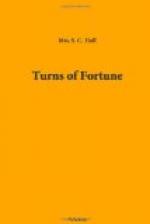Mrs. Adams burst into tears, and walked out of the room. Charles was convinced that she would not uphold his opinion.
“Certainly,” said John, “I intend to provide for my children; but there is no hurry, and”—
“There should be no hesitation in the case,” interrupted Charles; “every man intends to provide for his children. God forbid that I should imagine any man to be sufficiently wicked to say—I have been the means of bringing this child into existence—I have brought it up in the indulgence of all the luxuries with which I indulged myself; and now I intend to withdraw them all from it, and leave it to fight its own way through the world. No man could look on the face of the innocent child nestling in your bosom and say that; but if you do not appropriate a portion of the means you possess to save that child from the ‘hereafter,’ you act as if you had resolved so to cast it on the wild waters of a turbulent world.”
“But, Charles, I intend to do all that you counsel; no wonder poor Lucy could not bear these words, when I, your own and only brother, find them stern and reproachful; no wonder that such should be the case; of course I intend to provide for my children.”
“Then DO IT,” said Charles.
“Why, so I will; but cannot in a moment. I have already said there is no hurry. You must give a little time.”
“The time may come, my dear John, when TIME will give you no time. You have been spending over and above your debt—more than, as the father of four children, you have any right to spend. The duty parents owe their children in this respect has preyed more strongly on my mind than usual, as I have been called on lately to witness its effects—to see its misery. One family at Repton, a family of eight children, has been left entirely without provision, by a man who enjoyed a situation of five hundred a-year in quarterly payments.”
“That man is, however, guiltless. What could he save out of five hundred a-year? How could he live on less?” replied the doctor.
“Live upon four, and insure his life for the benefit of those children. Nay,” continued Charles, in the vehemence of his feelings, “the man who does not provide means of existence for his helpless children, until they are able to provide for themselves, cannot be called a reasonable person; and the legislature ought to oblige such to contribute to a fund to prevent the spread of the worst sort of pauperism—that which comes upon well-born children from the carelessness or selfishness of their parents. God in his wisdom, and certainly in his mercy, removed the poor broken-hearted widow of the person I alluded to a month after his death; and the infant, whose nourishment from its birth had been mingled with bitterness, followed in a few days. I saw myself seven children crowd round the coffin that was provided by charity; I saw three taken to the workhouse, and the elder four distributed amongst kind-hearted hard-working people, who are trying to inure the young soft hands, accustomed to silken idleness, to the toils of homely industry. I ask you, John Adams, how the husband of that woman, the father of those children, can meet his God, when it is required of him to give an account of his stewardship?”




